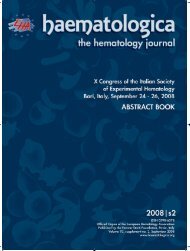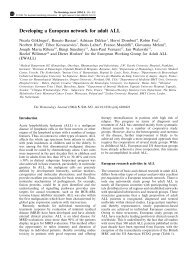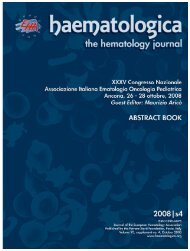12th Congress of the European Hematology ... - Haematologica
12th Congress of the European Hematology ... - Haematologica
12th Congress of the European Hematology ... - Haematologica
Create successful ePaper yourself
Turn your PDF publications into a flip-book with our unique Google optimized e-Paper software.
12 th <strong>Congress</strong> <strong>of</strong> <strong>the</strong> <strong>European</strong> <strong>Hematology</strong> Association<br />
receiving allogeneic/autologous stem cell transplantation. We analyzed<br />
retrospectively <strong>the</strong> charts <strong>of</strong> all patients who underwent stem cell transplant<br />
in 2005-2006 at Texas Tech University Health Science Center. The<br />
charts <strong>of</strong> 36 patients were reviewed <strong>of</strong> which 21 received kepivance.<br />
Decision to receive kepivance was judged by <strong>the</strong> treating physician.<br />
Patients with high risk <strong>of</strong> developing mucositis from intensive<br />
chemo<strong>the</strong>rapy, older patients, type <strong>of</strong> conditioning regimen, and type <strong>of</strong><br />
transplant dictated which patient should receive kepivance. Conditioning<br />
regimens in <strong>the</strong> kepivance group were as follows: high dose melphalan<br />
(10); TBI, VP-16 and cyclophosphamide (CTX) (1); BCNU, VP-16<br />
and CTX (2); fludarabine and melphalan (1); melphalan and VP-16 (1);<br />
busulfan and fludarabine (6). Conditioning regimens in <strong>the</strong> non-kepivance<br />
group were as follows: melphalan and busulfan (1); melphalan and<br />
fludarabine (2); BCNU, VP-16 and CTX (4); high dose melphalan (8). Out<br />
<strong>of</strong> 21 patients who received kepivance, 12 patients received autologous<br />
transplant and 9 patients received allogeneic transplants. Of <strong>the</strong> 21<br />
patients who received kepivance, 8 experienced grade II-III mucositis<br />
compared to 3 <strong>of</strong> 15 patients in <strong>the</strong> non- kepivance group. No patients<br />
in both groups experienced grade IV mucositis. In both groups 50% <strong>of</strong><br />
<strong>the</strong> patients required total parenteral nutrition (TPN). The average length<br />
<strong>of</strong> stay in patients who received kepivance was 31 days vs. 36 days in<br />
patients who did not receive kepivance. Day 100 mortality, in <strong>the</strong> kepivance<br />
group was 5, all <strong>of</strong> whom received allogeneic transplant, whereas<br />
<strong>the</strong>re was only 1 death (who received allogeneic transplantation) in<br />
<strong>the</strong> non-kepivance group. We concluded that kepivance reduces <strong>the</strong> hospital<br />
stay in patients undergoing stem cell transplantation. However,<br />
<strong>the</strong>re were no noted benefits <strong>of</strong> kepivance in TPN requirement or <strong>the</strong><br />
incidence <strong>of</strong> mucositis. This may be due to physician bias in selecting<br />
patients who should receive kepivance. High risk patients received kepivance.<br />
All <strong>the</strong> 9 patients in <strong>the</strong> kepivance group who received allogeneic<br />
transplant did not experience acute graft versus host disease. A<br />
prospective randomized clinical trial is needed to confirm <strong>the</strong>se results.<br />
1221<br />
NOT PUBLISHED<br />
1222<br />
ACUTE CORONARY SYNDROME AND THROMBOPHILIC POLYMORPHISM<br />
M.R. Gutierrez-Tous<br />
University Hospital Valme, SEVILLA, Spain<br />
Background. The thrombophilic polymorphisms, Factor V G1691A (Leiden),<br />
Prothrombin G20210A Mutation (PT G20210A) and C46T <strong>of</strong> Factor<br />
XII gene, are genetic variants in relation to venous thrombotic desease;<br />
in <strong>the</strong> arterial thrombosis and <strong>the</strong> acute coronary syndrome his mean had<br />
not been established, because currently <strong>the</strong> dates in relation to thrombophilic<br />
risk factor are contradictory. Aims. The objective <strong>of</strong> this study is<br />
to define <strong>the</strong> prevalence in own people <strong>of</strong> <strong>the</strong> Phrotrombin 20210 Mutation,<br />
<strong>the</strong> Factor V Leiden and C46T polymorphism in <strong>the</strong> Factor XII gene<br />
in health people and patients with acute coronary syndrome and to establish<br />
<strong>the</strong> thrombophilic risk factor respectively. Methods. A prospective<br />
study case/control we were included 483 subjects (76 patients and 407<br />
controls).<br />
Table 1. Prevalence <strong>of</strong> thrombophilic polymorphism in acute coronary syndrome<br />
and controls.<br />
The patients are recruitment enter <strong>the</strong> survivals with acute coronary<br />
syndrome, at lest three month after <strong>the</strong> event. The controls are healthy<br />
persons, blood donors, <strong>the</strong>y were included in <strong>the</strong> study voluntarily. In <strong>the</strong><br />
group <strong>of</strong> patients, 61 (80.3%) subjects are men and 15 (19.7%) are women;<br />
in <strong>the</strong> controls, 271 (66.6%) subjects are men and 136 (33.4%) are women.<br />
The median <strong>of</strong> age <strong>of</strong> <strong>the</strong> patients is 49.9 years (24-74) with typical deviation<br />
12.8 at <strong>the</strong> moment <strong>of</strong> <strong>the</strong> event, 48 (63.2%) patients are 55 years<br />
446 | haematologica/<strong>the</strong> hematology journal | 2007; 92(s1)<br />
old or less, because this study is planning in young people; in <strong>the</strong> group<br />
<strong>of</strong> <strong>the</strong> controls <strong>the</strong> median is 38.4 years (21-72) typical deviation 10.7.<br />
The detection <strong>of</strong> <strong>the</strong> Prothrombin 20210 Mutation, <strong>the</strong> Factor V Leiden<br />
and <strong>the</strong> polymorphism 46C/T <strong>of</strong> Factor XII gene, by PCR in real time, in<br />
liquid phase, in a LightCycler (Roche diagnostics) <strong>the</strong>rmal cycler was<br />
made. Stadistical methodology, <strong>the</strong> descriptive was made by groups in<br />
patients and controls; to estimate <strong>the</strong> risk by square-chi pro<strong>of</strong>. Results. The<br />
results <strong>of</strong> <strong>the</strong> prevalence <strong>of</strong> <strong>the</strong> polymorphisms, Factor V Leiden, Prothrombin<br />
G20210A Mutation and C46T <strong>of</strong> Factor XII gene, in patients and<br />
controls in <strong>the</strong> Table 1 are showed. The estimate risk to have got an acute<br />
coronary syndrome in relation to genotype GA <strong>of</strong> <strong>the</strong> Prothrombin<br />
G20210A Mutation is 2.8 (1.1-7.2) IC (95%) p=0.025. Conclusion. The Prothrombin<br />
G20210A Mutation is a risk factor for acute coronary syndrome<br />
Supported by research project : SAS 0037/2005<br />
1223<br />
PROGNOSTIC AND CLINICAL SIGNIFICANCE OF CELL CYCLE PROTEINS IN LEUKEMIC<br />
CELLS IN CHILDREN WITH ACUTE LEUKEMIA<br />
T. Astrelina, E. Osipova, E. Vladimirskaya<br />
Research Institute <strong>of</strong> Pediatric Hematol, MOSCOW, Russian Federation<br />
Background. The investigation <strong>of</strong> <strong>the</strong> cell cycle proteins may occur<br />
very useful in understanding <strong>the</strong> mechanisms <strong>of</strong> cell resistance to<br />
chemo<strong>the</strong>rapy <strong>the</strong> biological basis for <strong>the</strong> <strong>the</strong>rapy <strong>of</strong> leukemia. Aims. to<br />
estimate <strong>the</strong> expression <strong>of</strong> several proteins involved in <strong>the</strong> cell cycle and<br />
<strong>the</strong> regulation <strong>of</strong> cell proliferation in leukemic cells in cases in childhood<br />
with acute leukemia. Methods. The material <strong>of</strong> <strong>the</strong> study-bone marrow<br />
from 79 children with initial diagnosed ALL, 37 children with initial<br />
diagnosed AML and 7 controls (leukocytes peripheral blood from<br />
healthy donors). We studied <strong>the</strong> quantities <strong>of</strong> several proteins cyclindependent<br />
kinases (cdk2 and cdk4) and cyclins (cyclin D, cyclin E), E2F1<br />
and pRb by Western blotting. The rate <strong>of</strong> proliferating cells was analyzed<br />
by flow cytometry, using nuclear cell proliferation-associated antigen<br />
(Ki67). Results. The levels <strong>of</strong> expression <strong>of</strong> cyclin D, cyclin E, cdk2 and<br />
cdk4 was much higher <strong>of</strong> initial B-ALL in children in comparison with<br />
T-ALL, pro-B-ALL and controls(p






